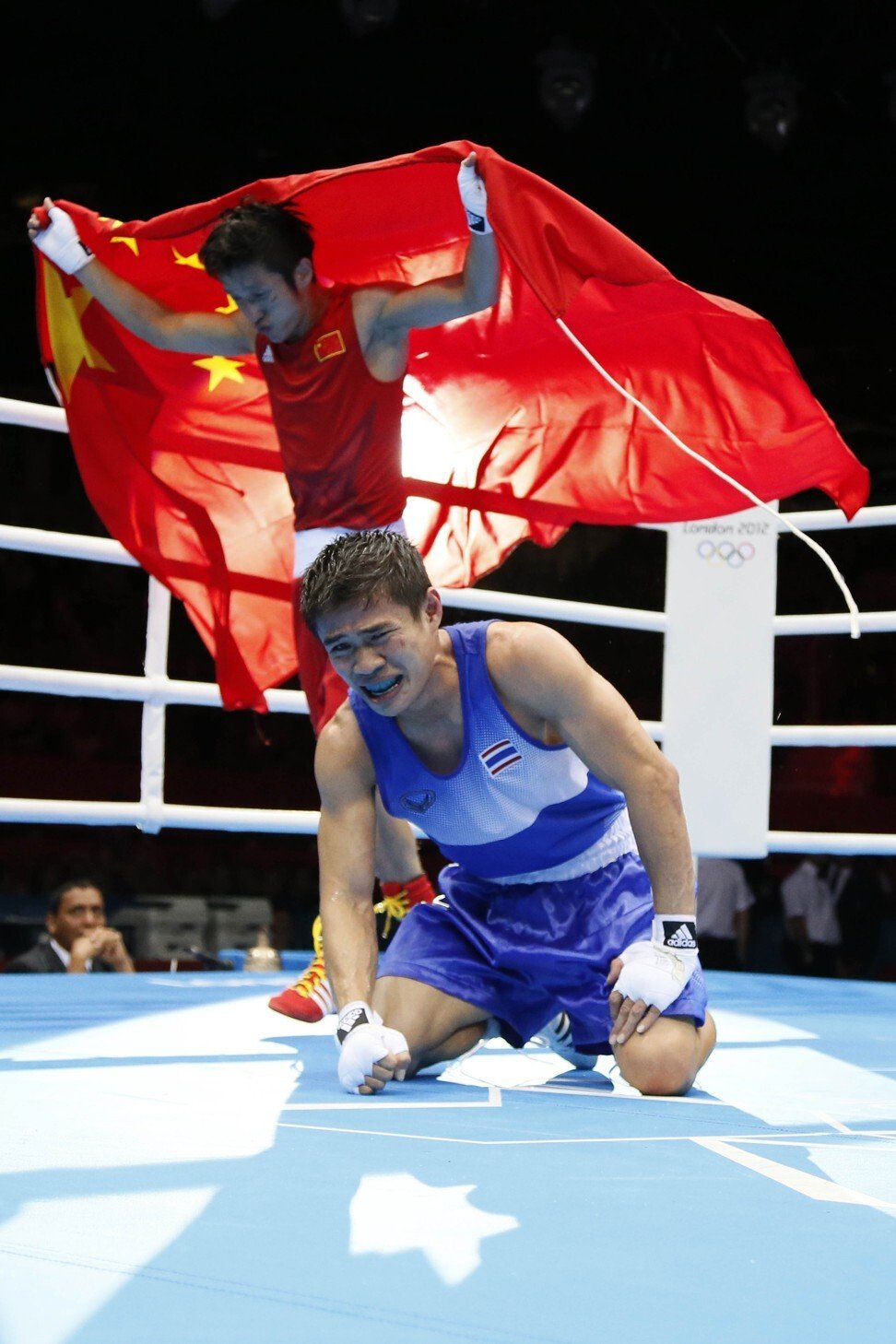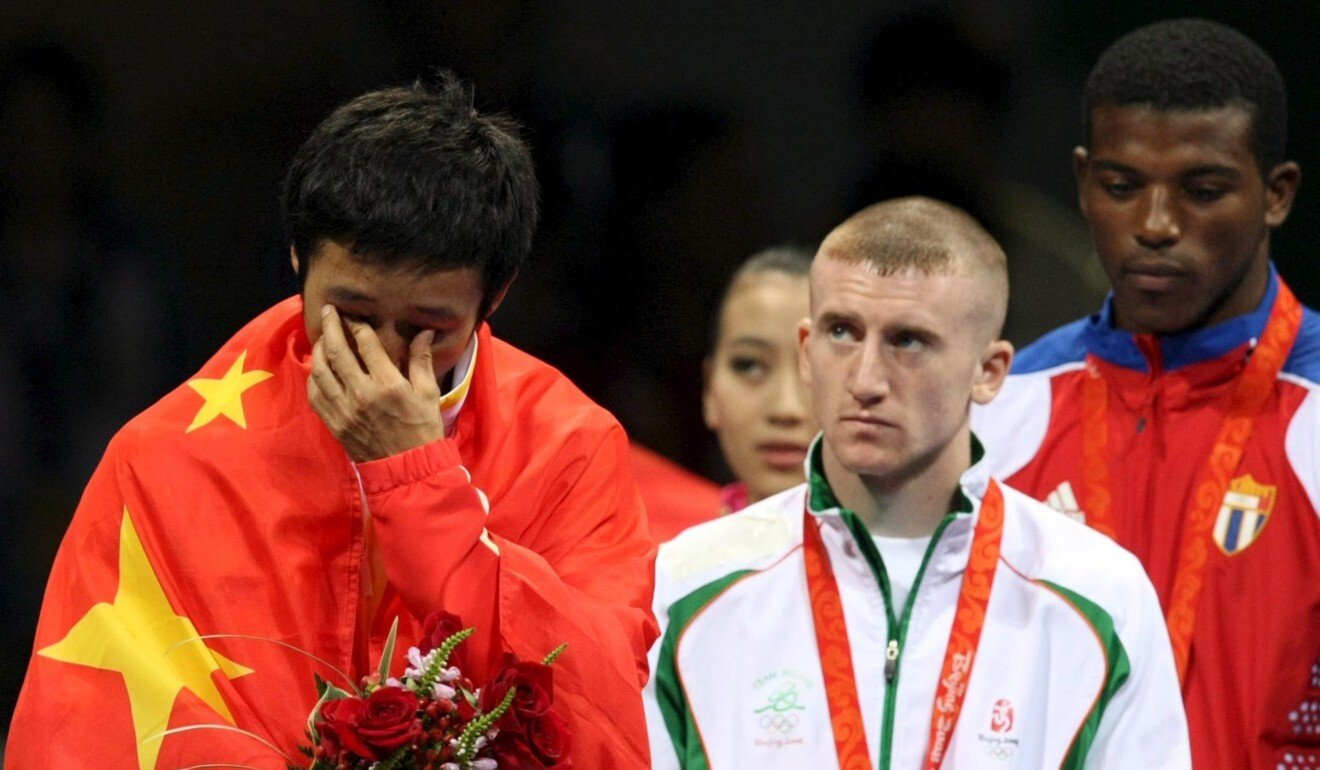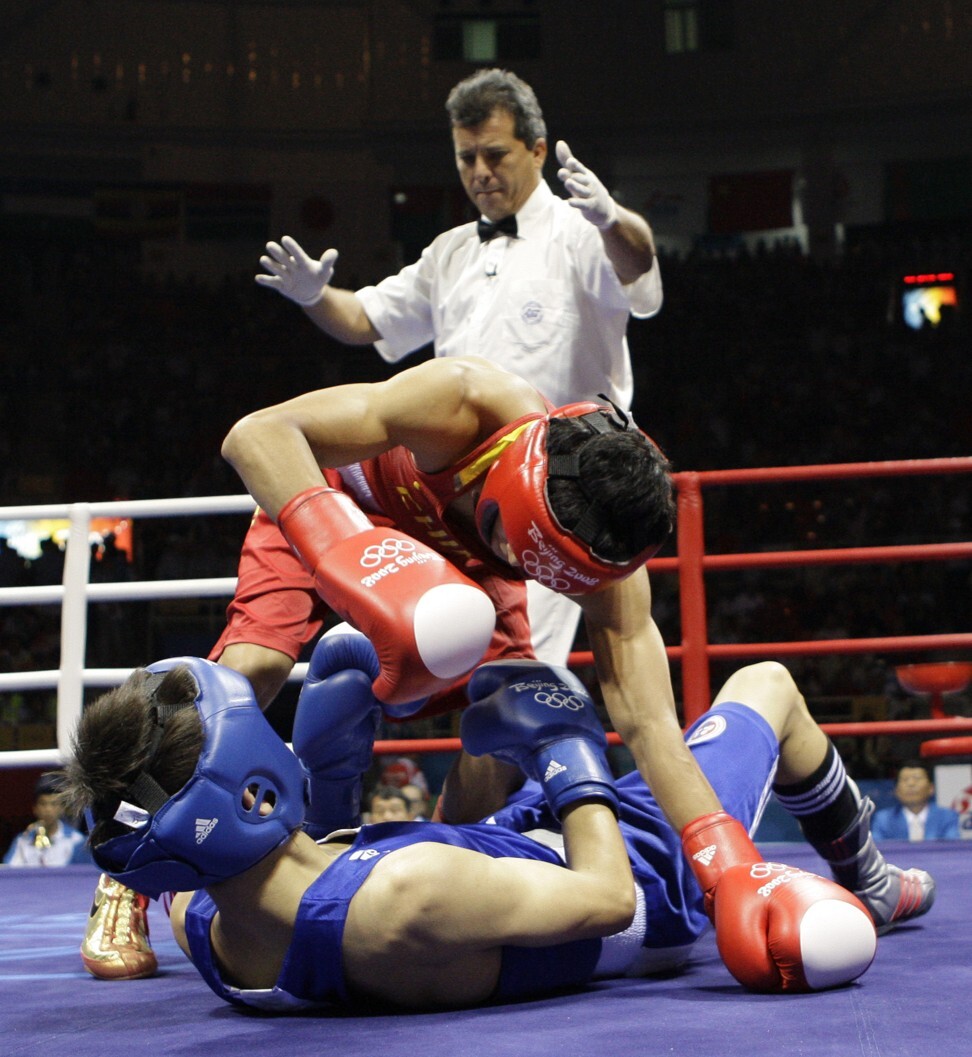
On this day: Zou Shiming wins China’s first Olympic boxing gold at Beijing 2008 Games
- Boxer made history and would go on to win gold again at London 2012, where final decision was booed by the crowd
- Professional world title would follow before shock defeat to Sho Kumura in 2017 ends pioneer’s career
It came not with a bang but a whimper. Mongolia’s Purevdorjiin Serdamba injured his shoulder at the tail end of the second round and could not fight on.
That meant China had won its 50th and final gold medal of the Beijing 2008 Olympics, on the last day no less, and its first ever boxing gold.
It came as a shock to Zou. “When the result was announced I just didn’t expect it to be settled in that way,” he told the Financial Times in 2012 as the London Games loomed.

“I had always thought that the final rounds would be close and the fight would be intense. Then all of a sudden I was an Olympic champion,” he recalls. “In interviews after the match I was sputtering and could hardly tell which way was up.”
The pressure had been on, with Chinese television mentioning that he could be the country’s 50th gold. He had not slept the night before the final but napped after breakfast.

The sport’s reputation meant Zou, who would later call Ali his idol, started in secrecy.
“I dared not tell my parents when I began to learn boxing when I was 14 or 15 years old,” he told Shanghai’s Shine newspaper. “My mother still objected to me making it a career even when I was selected for the provincial team in Guizhou. Not until I was to represent China in the Olympics for the first time, did my mother change her attitude.”

That came in Athens in 2004, where he won bronze, although he said he had been careless during the tournament.
“Inexperience cost him as he threw away a semi-final lead in Athens to eventual winner Yan Barthelemi Varela of Cuba. Older and wiser, he’s at the peak of his powers – as his victory at the world championships in Chicago last year proved,” the Post wrote in its pre-Beijing profile.
That was when Zou, born in Guizhou in 1981, first felt he could become an Olympian. He was delighted to beat Barthelemi at the worlds after a frenzied fight and the media picked up on it.
“A newspaper commentated that China’s boxing team beating Cuba is like Cuba’s table tennis team thrashing China. From that time on, I began to think I could be in the Olympics.” Zou told CGTN, the English language arm of state broadcaster CCTV, in an interview in 2018, after they named him one of the “Faces of Reform and Opening-up”.
In the years between the Athens and Beijing Games he honed his own game, winning the 2005 and 2007 world amateur championships, becoming the first Chinese to do so. He caught the attention of Don King, who asked him to turn pro.
Beijing 2008 and gold was the only focus, though.
“At the time we changed all of our numbers to 2008, my phone number, even my car number plate,” he told CGTN. “It’s my lucky number,” he told the Financial Times ahead of London 2012.
Still, Zou would question his luck in and out of the ring in Beijing.
“There are too many things that happened. I remember right before the day of weigh-in, my head was knocked by someone’s elbow, and started bleeding and I didn’t dare to report my injury because if my opponent’s coach knew, they would attack my wound,” he told CGTN.
“In the round of 16, I was facing a French guy. I didn’t want to get too close to my opponent even though I was losing on points and after every round, when I was resting, my coach told me how much I was behind. I told myself, ‘You can’t lose, if you lose there will be no gold.’ I was wondering: ‘do I really not have the luck to win an Olympic title?’
“In the last round, from the edge of the ring to the middle, the distance is very short, but I was thinking a lot. It was like a movie going on in my head. Then I suddenly stopped thinking, and told myself ‘you are a man, you have to survive this.’ And when it started, I tried hard to find opportunities, and never stopped fighting back even I was hit.
“I managed to knock my opponent to the ground. When it all ended, the referee was holding both of our hands and waiting for the result. It was too close and it took a long time to calculate. I had such huge belief, I had been waiting for this moment for too long, I have to win the gold.”

He did, realising a dream that he’d had for more than a decade.
“I remember being moved to tears at seeing a Chinese athlete standing on top of the podium at the Atlanta Games,” he said on his blog. “I started to imagine I could do the same for my country,” Zou wrote in the lead-up to the Beijing Games.
Victory would change his plans. “We had a victory meeting, I was showing my medal to my boss and wanted to tell him that I have finished my mission and want to start my career as a professional boxer,” Zou told CGTN.

“Before I spoke, my boss said to me: ‘Shiming, China’s boxing can’t only have one gold medal, you have to earn another gold in London’. This meant not having a golden age in a pro career and focusing on the Olympics.”
There would be more tears in London in 2012 but not from Zou, who claimed a second gold medal.
His opponent in the gold medal match, the Thai fighter Kaeo Pongprayoon, who had been the more aggressive, cried as Zou was announced champion. Boos rang out from the crowd at the ExCel Arena. The Thai, whose coach was furious, cried again as March of the Volunteers was played, while Zou was jeered once more on the podium.

Controversial officiating at the Olympics is nothing new, with the low point still regarded as Roy Jones Jnr being robbed against South Korea’s Park Si-hun in Seoul in 1988. Even at the London Games, 24 years on, the BBC’s Newsnight ran a report on questionable decisions at the Olympics.
Zou was unmoved in the post-fight interviews. “We both fought very well. It was a very even contest and I felt I was just marginally better,” Zou said after the fight.
Pongprayoon disagreed, questioning the whole tournament.

“I feel that I won and I could see that the crowd thought I won. I don’t know why I lost,” he said. “I think the points system at the Olympics is wrong or strange – not just my fight but others didn’t go the way they should have.
“I’ve lost to him twice before and both times I think I should have won. I’m still really happy. I’m sorry I couldn’t get gold for my mum, my dad and my kid. I did all I could,” he added.
“Every match was difficult, both for me and my opponents,” Zou said, after a tournament where he complained of double vision and was unconvincing in victory.
I’m not ready to quit the ring, says Chinese boxing star Zou Shiming
“Second gold medal is great for me. I’m enjoying it. I’ve promised them I would bring back home another Olympics gold, and today I fulfilled my goal,” he said.
“There was too much pressure. Luckily I won the match after all. All I want to do now is to have a very very good rest.”
The following year, Zou would finally go pro, signing with Bob Arum at Top Rank in January.
Chinese boxing star Zou Shiming not ready to retire despite eye damage
“Zou is an incredible talent who is beloved in the People’s Republic of China,” Arum said. “We at Top Rank will make every effort to make certain that he has a spectacular career as a professional boxer.”
He would be trained by Freddie Roach and by that September the Financial Times had named him one of their “25 Chinese to watch”, alongside CCP leader-in-waiting Hu Chunhua and Tencent’s Pony Ma.

It was around this time Zou also moved into film and television. He had a cameo in Transformers: Age of Extinction, starred in a Beats headphones advert with LeBron James and Serena Williams, and appeared in the Chinese TV series Dad, Where Are We Going? with his son.
Now, he was finally ready for a starring role in the ring and another crack at a world flyweight title.

“I didn’t really feel pressure. I felt calm and relaxed throughout the bout,” said Zou, who was seen smiling as he returned to his stool after each round.
“It was a fight I had to win but I had to make it more exciting,” said Zou at the post-fight press conference. “I won Olympic gold medals and now I have the pro title. I can promote boxing better in China now.”

He was unrepentant.
“Though I lost, I helped draw attention to boxing to millions of Chinese, and I think it was worth it,” roared the emotional Zou after getting up from the canvas one minute after the sensational knockout.
Wife’s leaked messages claiming Zou was owed millions denied by agents
“We Chinese boxers have always been looked down upon and lost to foreigners, but we still have to safeguard the dignity of Chinese people. That is the reason why I’m still here despite already grabbing the belt and Olympic title,” 36-year-old Zou sobbed, while also expressing his gratitude to the Shanghai crowd for its support.
“I’m carrying the hopes of all of China. I need to do things. I was not just fighting in the ring. My big dream is to train a new generation of Chinese world champions,” the Zunyi-born fighter said.
“I am crying not because I have lost, but because I helped promote boxing to millions of Chinese people. This is an achievement. In the past, Chinese boxers were easily defeated by the West but we are respected now. I shed blood and tears to get to this stage.”
“My personal success is not real success,” he told That’s Shanghai in August, 2016. I want to see thousands of ‘Zou Shimings’ out there fighting and winning medals; that would be real success to me.”
A year later Zou had launched his boxing school in Shanghai, working with local schools and while his career appears to be over, there’s no doubting he plotted the course of Chinese boxing.

